News
December 13, 2025 The AIR Lab celebrates closing of the year 2025 with so many accomplishments by its past and present members. Our efforts span progress and innovation across university research, industry, and government.
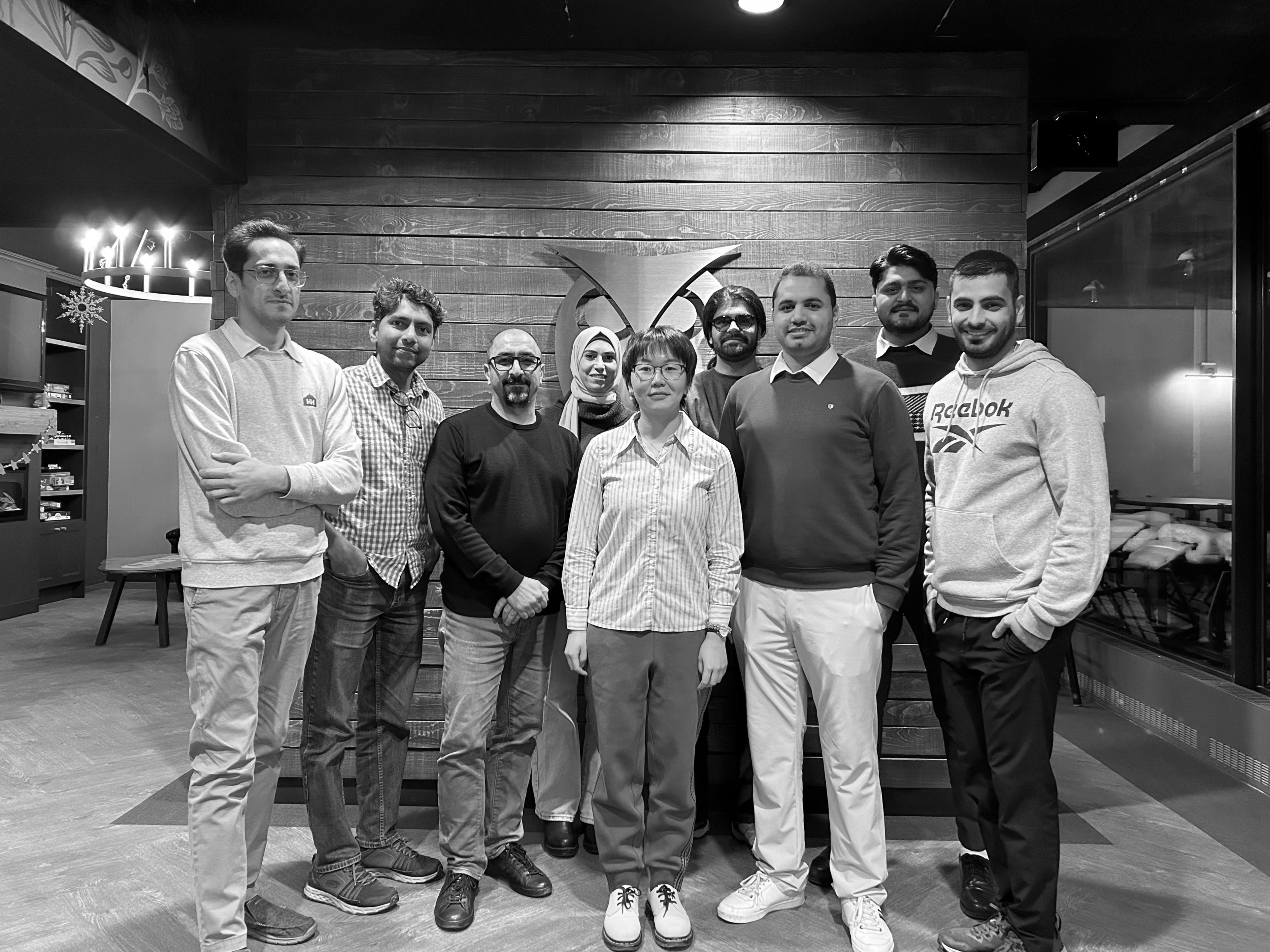
From left to right: Mohsen Moradi, Manoj Nambiar, Amir A. Aliabadi, Yusra Hasan, Hang Yin, Iman Sekhavati, Ali Madadizadeh, Muhammad Nauman Ashraf, and Mojtaba Safdari
March 31, 2025 Congratulations to the graduate students of the Environmental Fluid Mechanics (EFM) class at the School of Engineering, University of Guelph, for successfully finishing the course. This course is designed for future scientists and engineers to develop the fundamental and applied knowledge needed to understand, analyze, and design flow processes that occur in the environment: e.g. flows for the atmosphere, oceans, rivers, built environment, and engineering applications. Physical and mathematical properties of fluid flow are investigated. These include equations of motion, statistical description of turbulent flows, mean flow equations, wall flows, scales of turbulent motion, and time and frequency domains. Practical aspects of measuring and analyzing fluid flow are also investigated. These include fundamentals of measurement, in-situ techniques, sonic and ultrasonic techniques, and electromagnetic techniques.
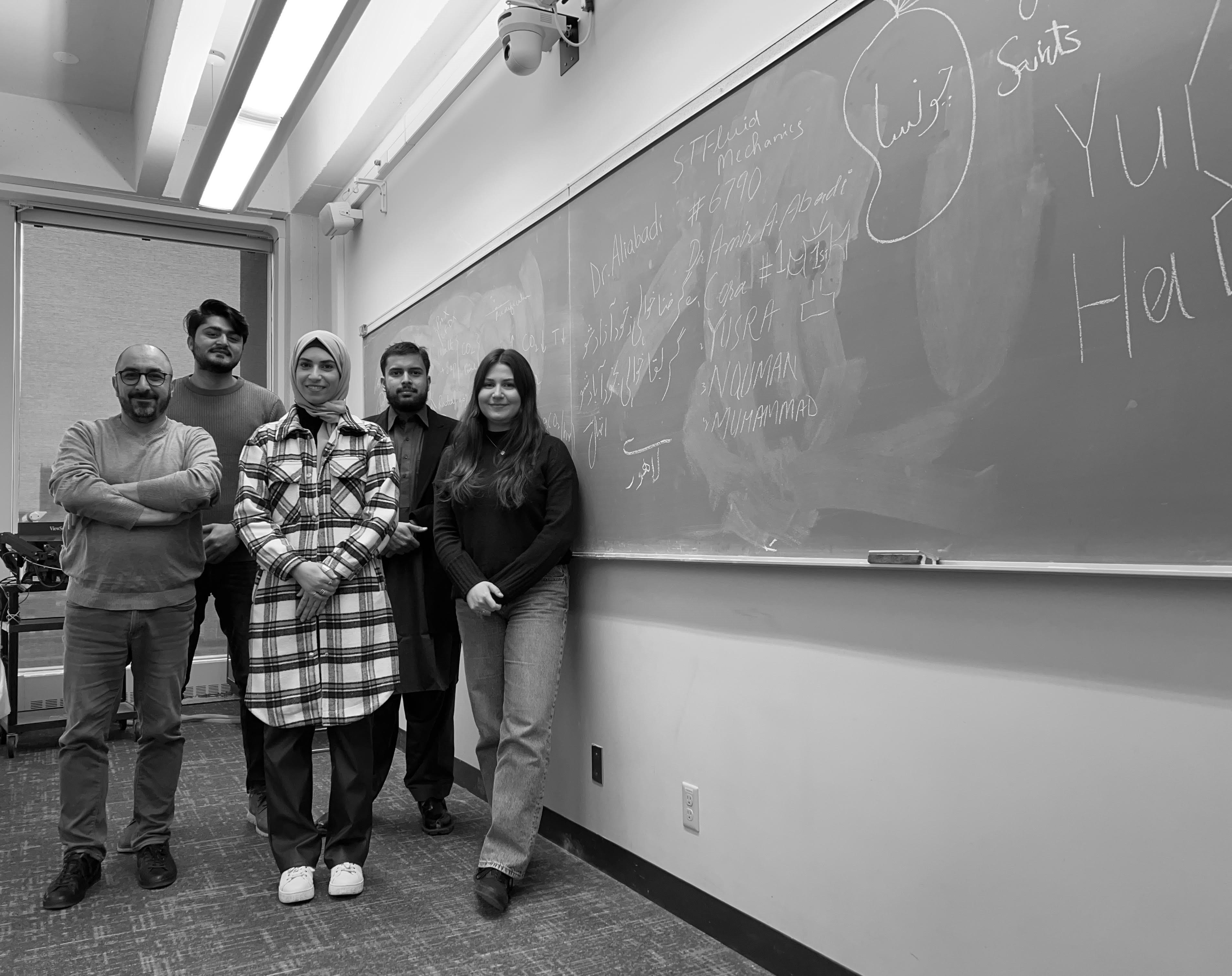
From left to right: Amir A. Aliabadi, Muhammad Nauman Ashraf, Yusra Hasan, Muhammad Zafar, and Cora Rose Dickie-Wilson
November 27, 2024 Congratulations to the undergraduate capstone project (41X) team for presenting their poster and built prototype during Design Day at the School of Engineering, University of Guelph. Supervised by the AIR lab, this team developed an alkaline water electrolyzer to produce hydrogen gas. This system is engineered to produce hydrogen safely and cost-effectively. The developed low-tech solution requires ambient pressure and temperature for hydrogen storage. It is ideal for applications of hydrogen as a fuel for building heating.
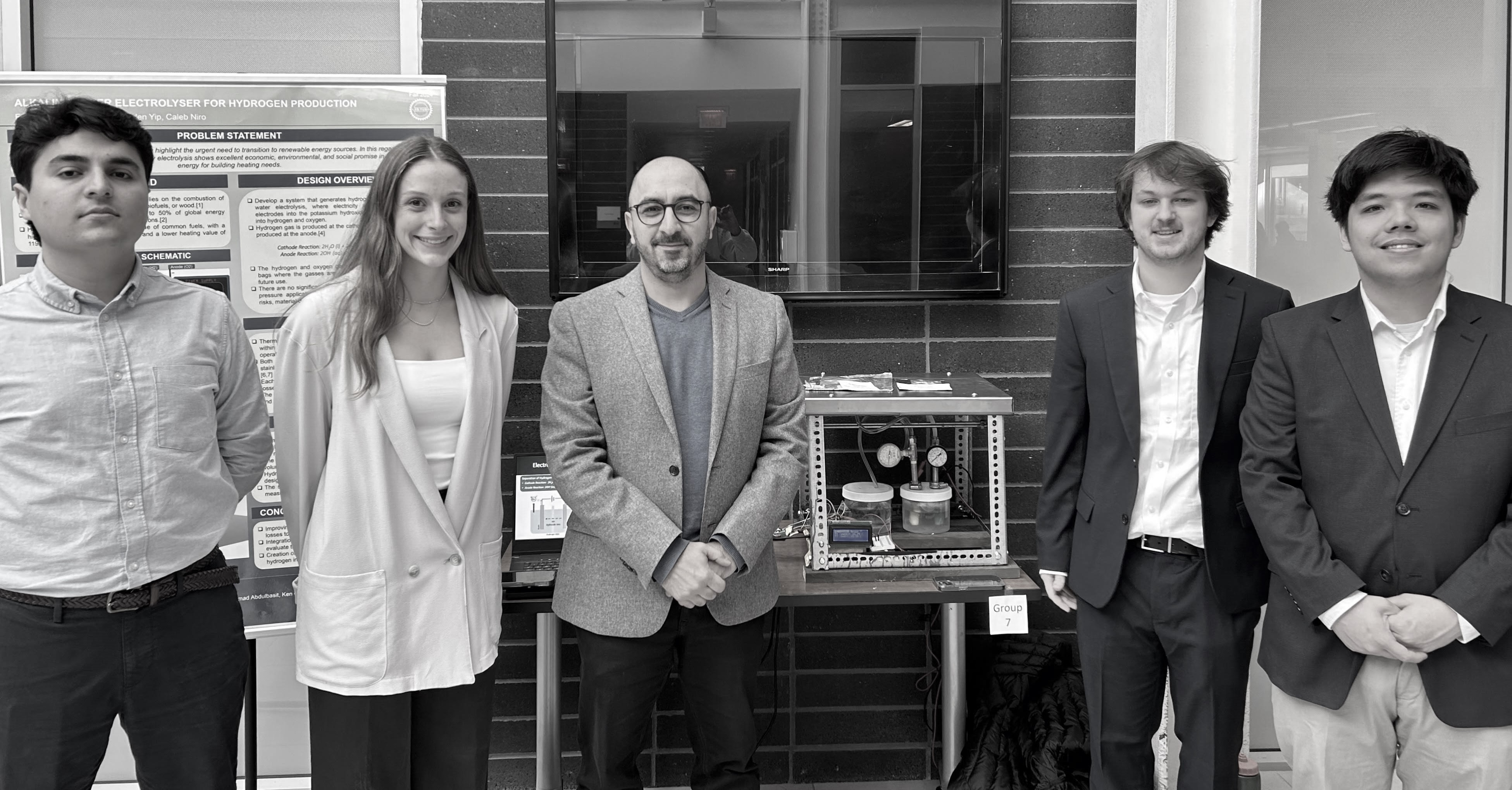
From left to right: Haider Ali, Emily Dryden, Amir A. Aliabadi, Caleb Niro, and Brayden Yip
July 24, 2024 Members of the Atmospheric Innovations Research (AIR) Laboratory at the University of Guelph celebrate the visit by Professor Lup Wai Chew from National University of Singapore (NUS). Professor Chew gave a seminar titled "Challenges and Opportunities of Airflow Modeling for the Built Environment."
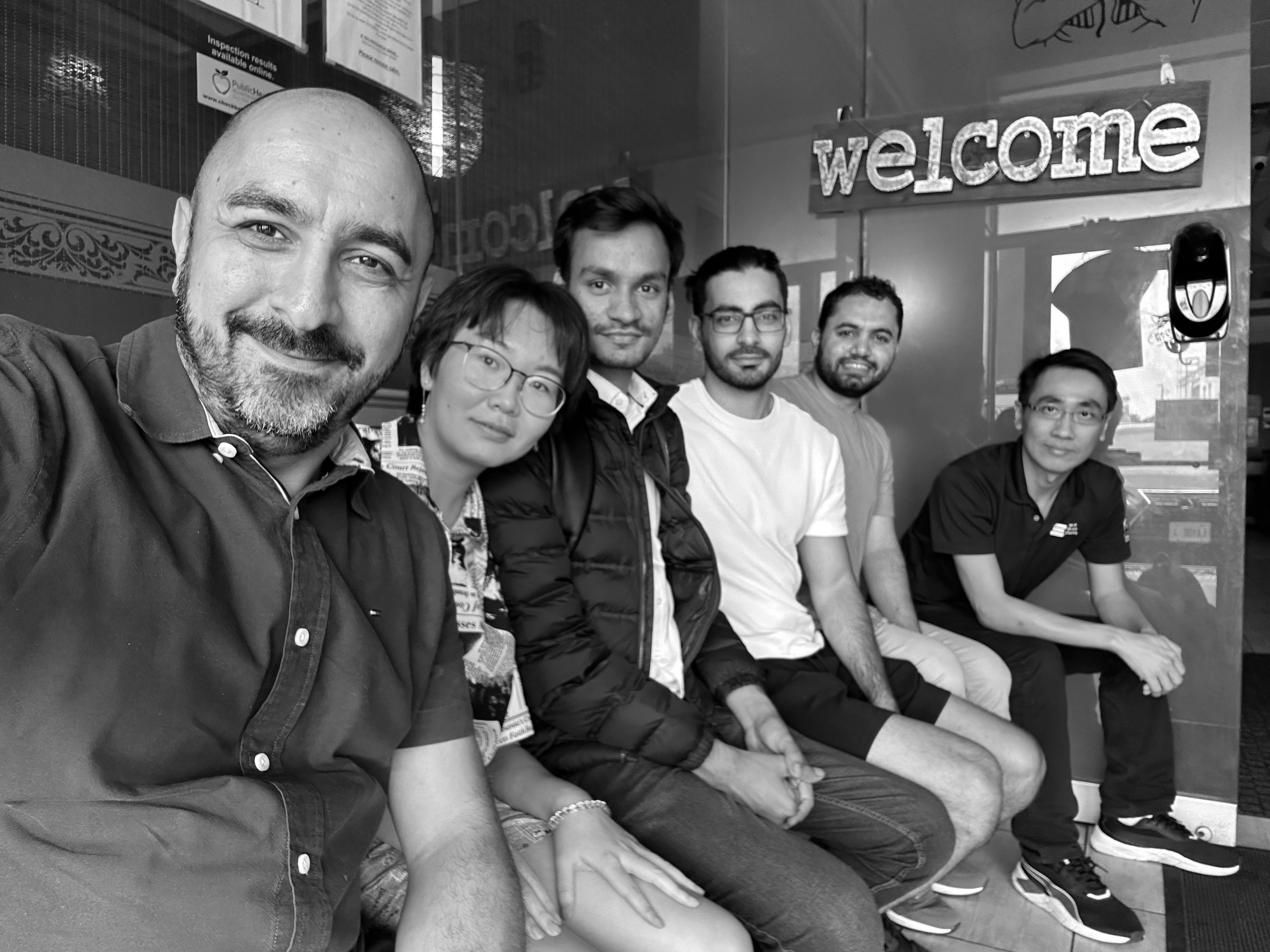
June 28, 2024 On June 27/28, 2024, the MIT Building Technology Program organized a Festschrift to mark the transition of long-term faculty member Les Norford to Professor Post-Tenure. For the event, we invited former students and colleagues who accompanied Les during his four decades-spanning career in building science and discussed topics that he has worked on. We thank all of our guests for joining us for this special event and Les for being the best colleague, mentor and friend any of us could have wished for: Amir A. Aliabadi, Peter Armstrong, Alpha Yacob Arsano, Ronita Bardhan, David Blum, Chao Yuan, Eduardo G. Alvarez, Nick Gayeski, Leon Glicksman, Nebyu Haile, Libby Hsu, Ali Irani, Forrest Meggers, Caitlin Mueller, Negin Nazarian, John Ochsendorf, Christoph Reinhart, Robert Stoner, Liping Wang, David Martin Warsinger, Tea Zakula. Link to Festschrift Publication
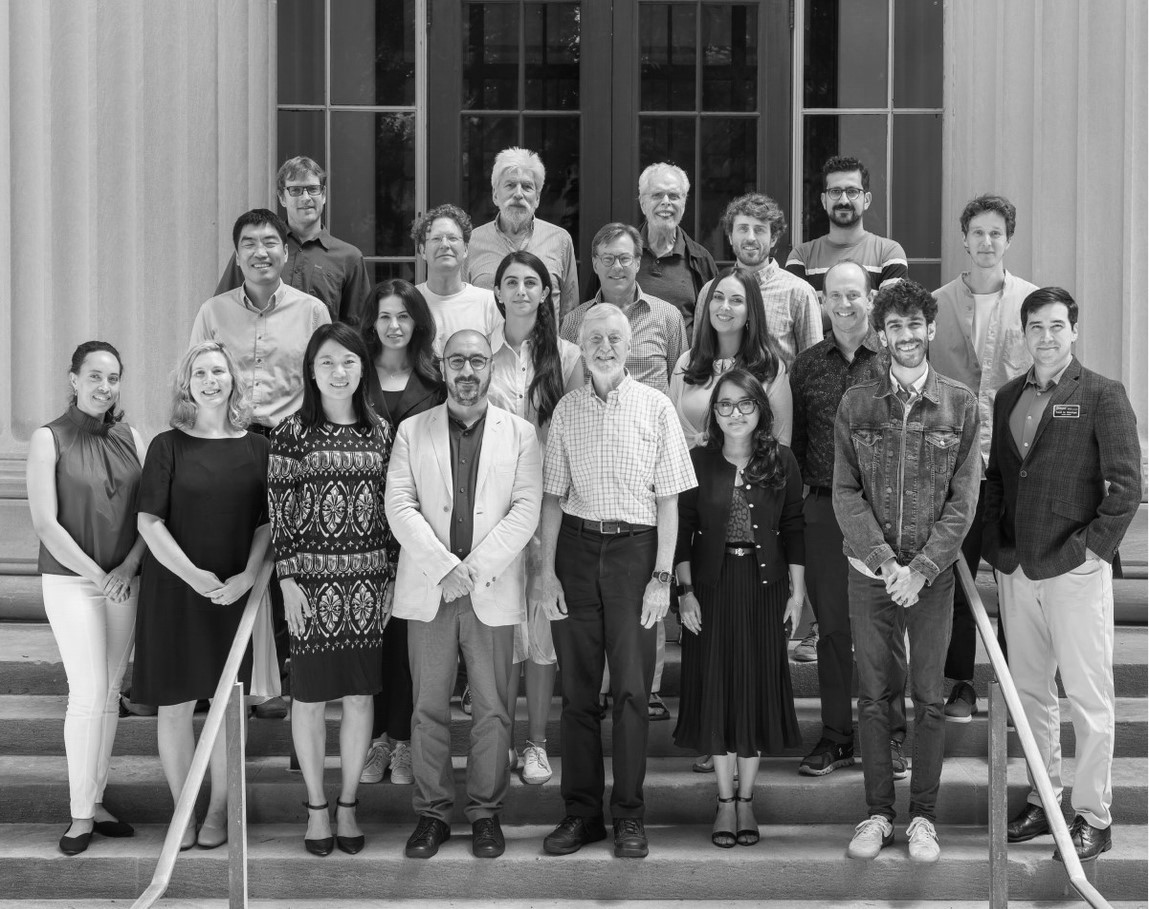
May 27, 2024 Amir A. Aliabadi gives a talk for the Canadian Society for Mechanical Engineering (CSME) and the CFD Society of Canada (CFDSC) conference in Toronto. The title of the talk is "Economics of Local Green Hydrogen for Building Heating in Canada". Link to Conference Website
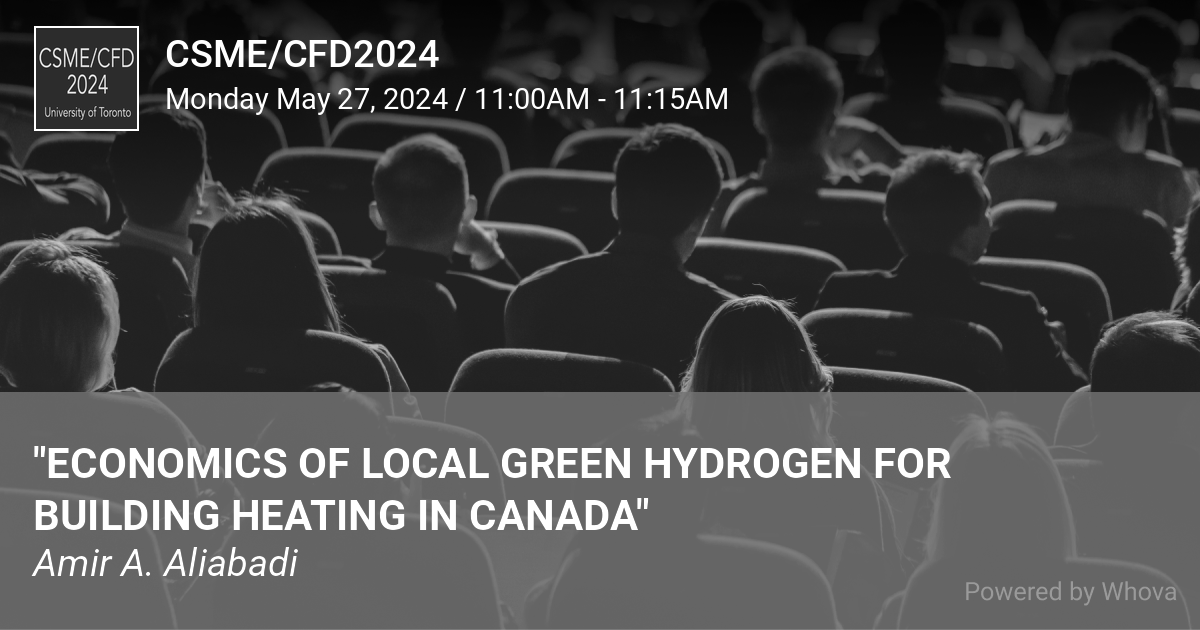
April 23, 2024 Amir A. Aliabadi takes a class photo with students of ENGG*1210: Engineering Mechanics at the University of Guelph. This course is a foundation for engineering, developing concepts in three-dimensional thinking, vector calculus, laws of motion, statics, and dynamics analysis of rigid bodies. It will lead to advanced courses in fluid, solid, quantum, orbital, and relativity mechanics.
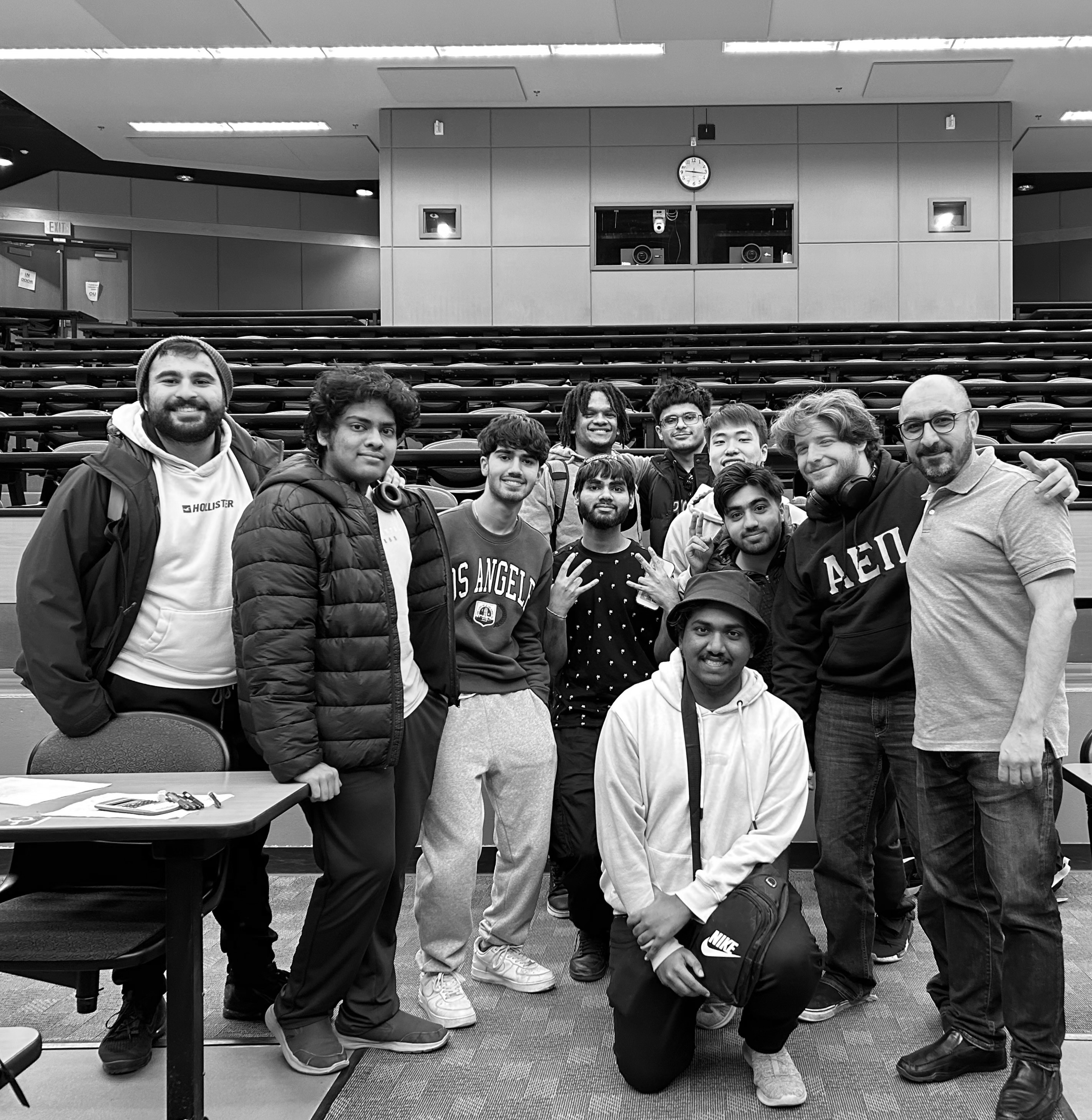
Class photo of Amir A. Aliabadi and students in the course ENGG*1210: Engineering Mechanics at the University of Guelph in Winter 2024.
April 5, 2024 Congratulations to the graduate students of the Environmental Fluid Mechanics (EFM) class at the School of Engineering, University of Guelph, for successfully finishing the course. This course is designed for future scientists and engineers to develop the fundamental and applied knowledge needed to understand, analyze, and design flow processes that occur in the environment: e.g. flows for the atmosphere, oceans, rivers, built environment, and engineering applications. Physical and mathematical properties of fluid flow are investigated. These include equations of motion, statistical description of turbulent flows, mean flow equations, wall flows, scales of turbulent motion, and time and frequency domains. Practical aspects of measuring and analyzing fluid flow are also investigated. These include fundamentals of measurement, in-situ techniques, sonic and ultrasonic techniques, and electromagnetic techniques.
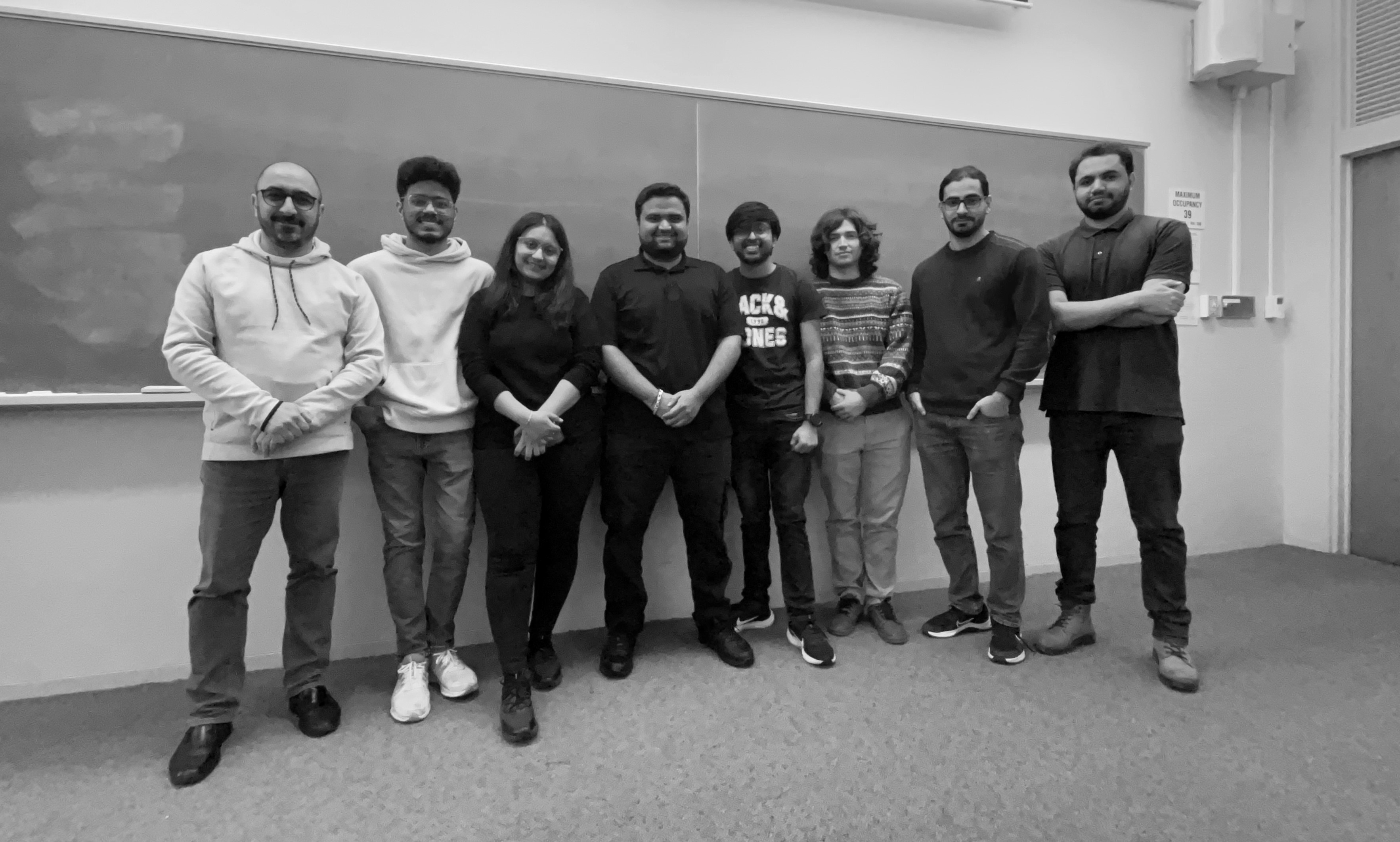
From left to right: Amir A. Aliabadi, Darshil Patel, Niyati Rashminbhai Gohel, Prince Maheshkumar Patel, Vishvesh Patel, Joel Csajaghy, Mojtaba Safdari, and Ali Madadizadeh
April 4, 2024 Congratulations to the undergraduate capstone project (41X) team for presenting their poster during Design Day at the School of Engineering, University of Guelph. Supervised by the AIR lab, this team developed a wildfire susceptibility machine learning model to predict the liklihood of wildfire given environmental conditions retrived from the ECMWF Reanalysis v5 (ERA5) data product and the fire incidents reported in the wildfire registry of the province of British Columbia. Their model is 75% accurate in predicting actual wildfire occurrences.
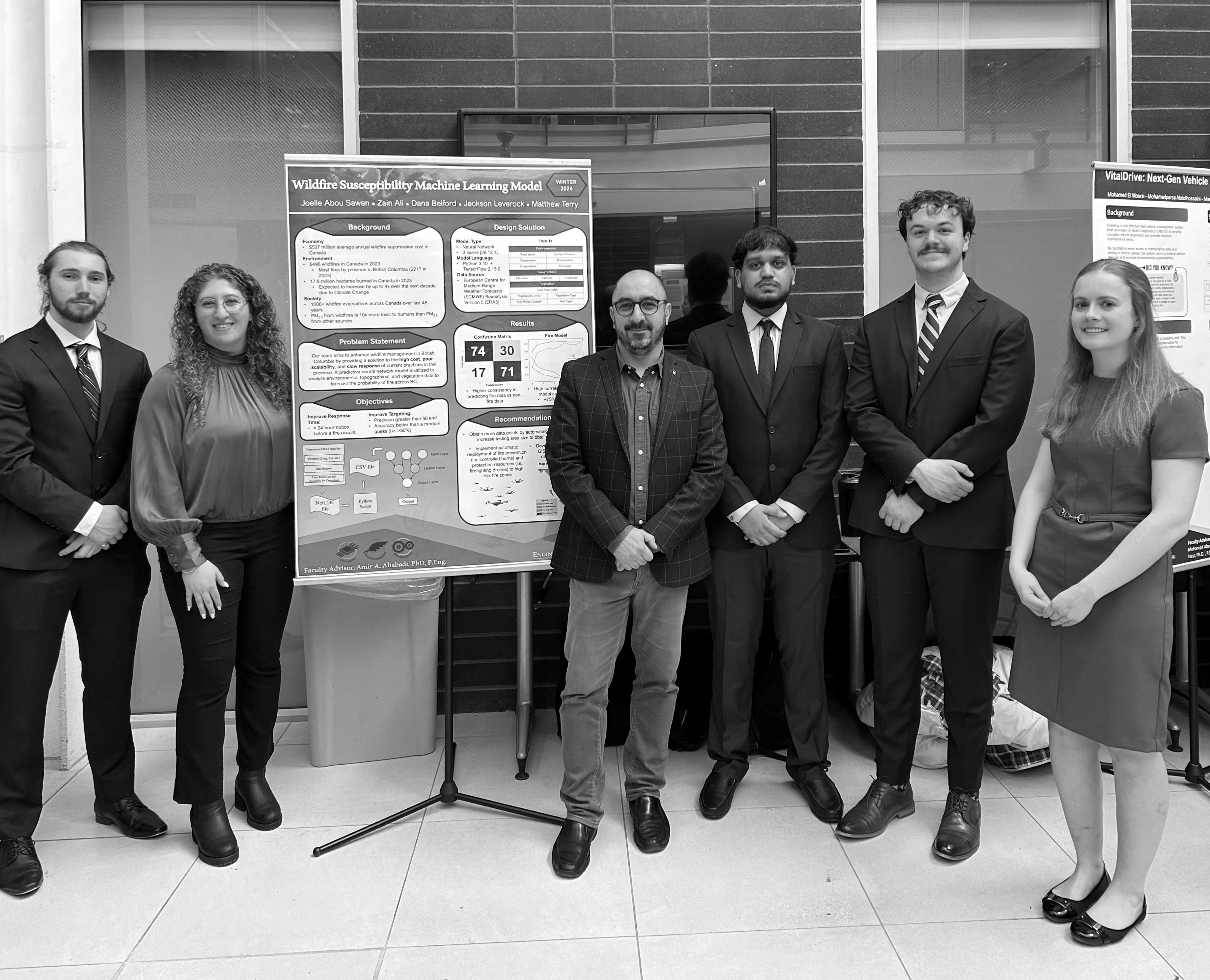
From left to right: Jackson Leverock, Joelle Abou Sawan, Amir A. Aliabadi, Zain Ali, Matthew Terry, and Dana Belford
March 20, 2024 Members of the Atmospheric Innovations Research (AIR) Laboratory at the University of Guelph celebrate Nowruz, the beginning of Spring season:

From left to right: Ali Madadizadeh, Mojtaba Safdari, and Amir A. Aliabadi
May 18, 2023 Members of the Atmospheric Innovations Research (AIR) Laboratory at the University of Guelph supervised by Amir A. Aliabadi as their primary supervisor:
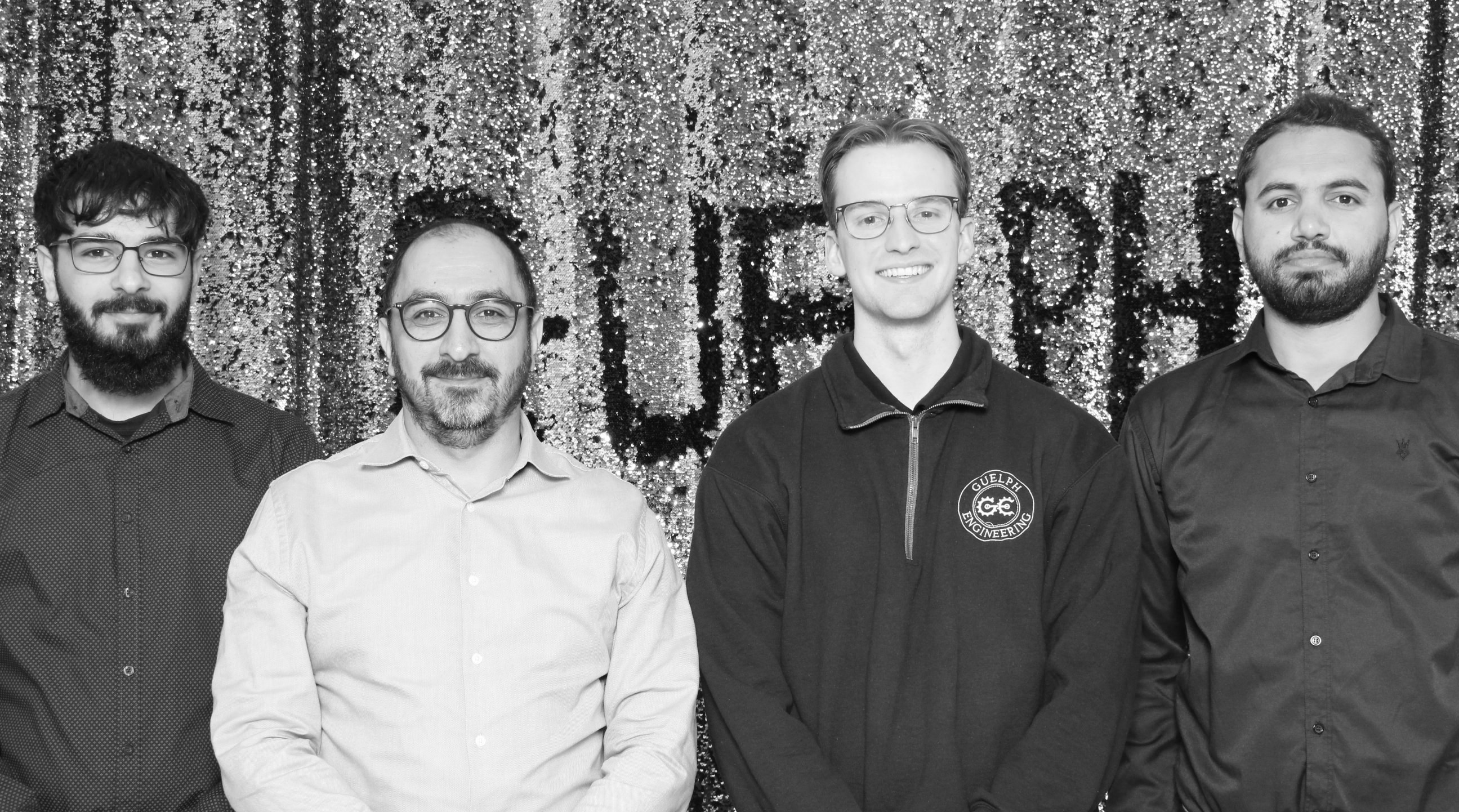
From left to right: Jashan Judge, Amir A. Aliabadi, William Childs, and Ali Madadizadeh
March 28, 2023 Group receives $3,786,000 in federal funding to improve multi-scale greenhouse emissions modelling from urban environments to enhance mitigation strategies. University of Guelph researchers including College of Engineering and Physical Sciences (CEPS) professor Dr. Amir Aliabadi and Ontario Agricultural College (OAC) professor Dr. E. Scott Krayenhoff are fighting climate change and mitigating its catastrophic consequences. Drs. Aliabadi and Krayenhoff are working on a University of Western Ontario project that has received funding in part by the Government of Canada's Climate Action and Awareness Fund. Dr. Kamran Siddique, as the Principal Investigator, will work to improve the accuracy of building and climate models. The Climate Action and Awareness Fund, created under the Environmental Damages Fund, will provide up to $206 million over five years to support Canadian-made projects that help to reduce Canada's greenhouse gas emissions. Link to News Article
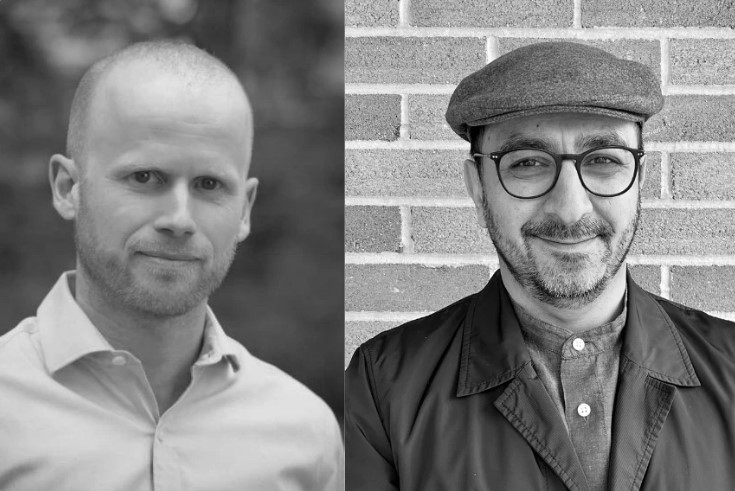
December 6, 2022 Rachel Maeve McLeod successfully defends her M.A.Sc. thesis titled: "Climate Zone-Based Energy Retrofits In Canada For Current and Future Climate Change Scenarios". Congratulations to Maeve!
June 26, 2022 Mohsen Moradi and Amir A. Aliabadi are featured in the Canadian Society for Mechanical Engineering's (CSME's) Bulletin 2022 Spring edition. The title of the published article is "The Characteristics of an Advanced Building Energy Model". Download Bulletin
June 26, 2022 Amir A. Aliabadi gives a seminar for the ASHRAE Annual Conference in Toronto. The title of the talk is "Toward New Paradigms in Building Energy Modeling" and the seminar series title is "Weather Modeling Tools for Buildings in a Changing Climate". Link to Conference Website
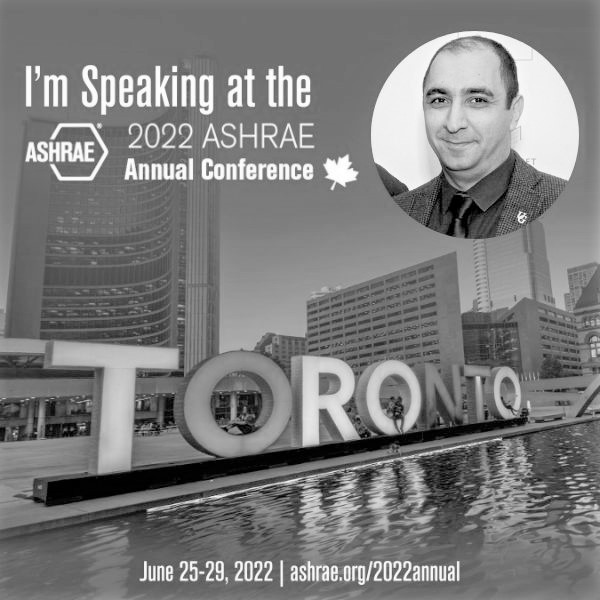
Februray 22, 2022 Amir A. Aliabadi participates in a Q&A exchange on "Measuring Thermal Comfort, Air Quality Using the Autonomous Robotic Environmental Sensor" in a recent ASHRAE Journal Newsletter by American Society of Heating, Refrigerating and Air-Conditioning Engineers (ASHRAE). In this newsletter a recent publications of the AIR lab has been featured. Link to Article
December 3, 2021 Seyedahmad Kia successfully defends his Ph.D. thesis titled: "Analysis and Modelling of Atmospheric Transport Over Open-Pit Mines". Congratulations to Seyedahmad!
November 23, 2021 The Vertical City Weather Generator (VCWG v2.0.0), developed by the AIR lab along with other national and international collaborators, is featured at the College of Engineering and Physical Sciences (CEPS) at the University of Guelph. Link to News.
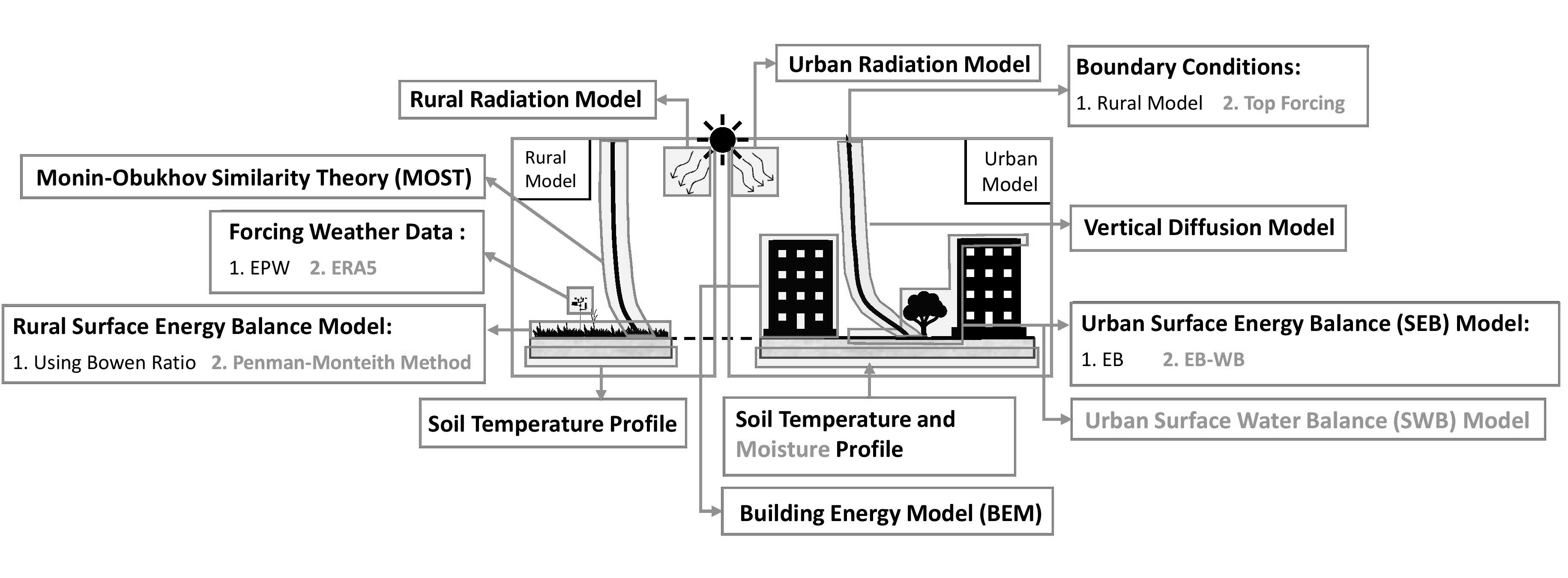
Overall Schematic of the Vertical City Weather Generator (VCWG) simulation program and its sub-models.
July 15, 2021 Mohsen Moradi successfully defends his Ph.D. thesis titled: "The Vertical City Weather Generator". Congratulations to Mohsen!
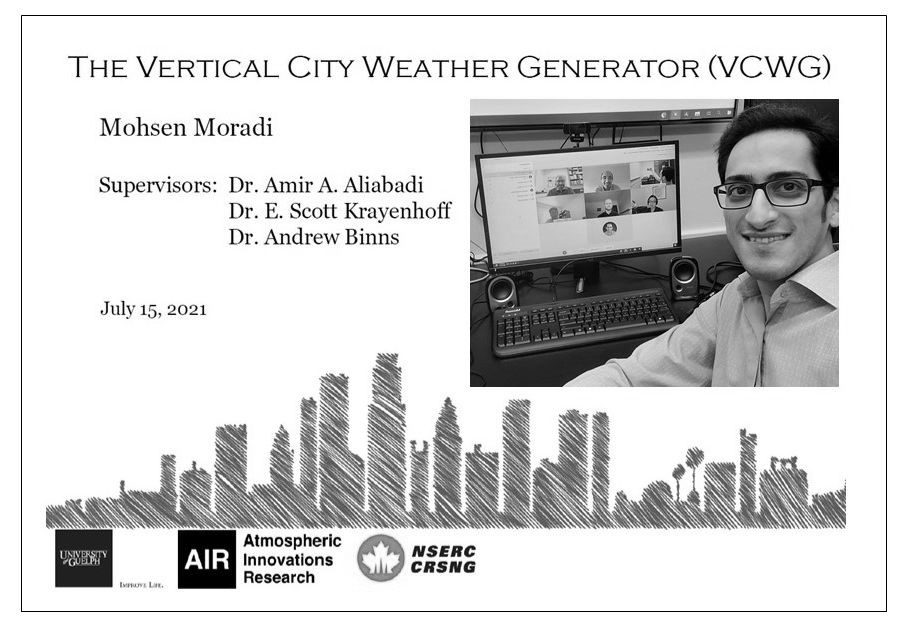
May 1, 2021 Do you think that paper citation records are related to the success or impact of a researcher? Nowadays paper citations are a source for both fame and anxiety for many researchers. Interpreting the citation records in relation to the success or impact of a researcher is very difficult. Recently the top 100 most-cited papers were analyzed in a Nature article by van Noorden et al. in 2014. There is evidence that a mountain of papers published attract no or only few citations, even those that made significant contributions to various fields of science. The top 100 most-cited papers did not mainly relate to new discoveries; the vast majority describe experimental methods or software that have become essential in their fields. Do you care about citation records? Download Article
April 13, 2021 Benjamin Dyer successfully defends his M.A.Sc. thesis titled: "ARES: The Autonomous Robotic Environmental Sensor". Congratulations to Benjamin!
December 8, 2020 Amir A. Aliabadi is serving as a guest editor for the Atmosphere journal for a special issue titled: Transport Phenomena in the Atmospheric Boundary Layer. In the context of the Atmospheric Boundary Layer (ABL), transport phenomena refer to the exchanges of momentum (wind velocity components), energy (temperature), and mass (water vapor, natural atmospheric constituents such as ozone, carbon dioxide, and inert gases, as well as gaseous and particulate pollutants). Such phenomena within ABL are not well understood due to complex physical and chemical processes that are ever-present in the ABL. Transport phenomena can be studied in either the Eulerian or Lagrangian frameworks. This special issue of Atmosphere invites research articles centered around understanding transport phenomena within the ABL from experimental, analytical, and numerical points of view across the scales from micro to meso scales. Preference will be given to articles that investigate transport phenomena within the ABL at some level of fundamental and mathematical depth. Link to Special Issue.
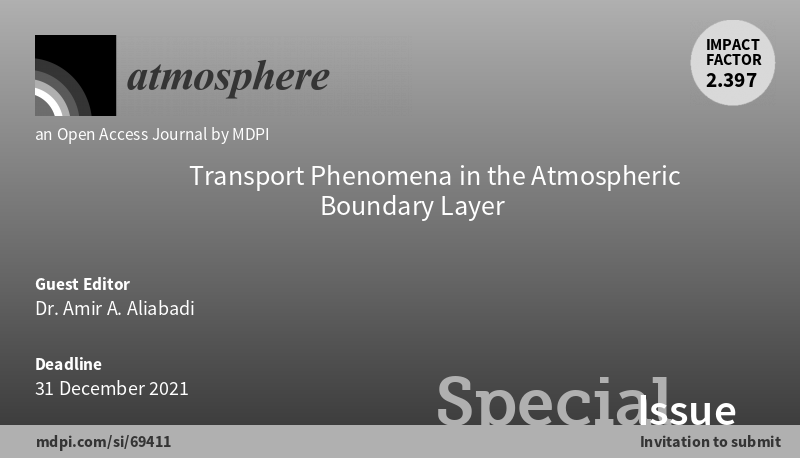
November 10, 2020 Amir A. Aliabadi is honored to be part of a team receiving the NSERC Brockhouse Canada Prize for Interdisciplinary Research in Science and Engineering. This team was involved in a Network on Climate and Aerosols (NETCARE). Link to Brockhouse Canada Prize Website - Link to NETCARE Website.
November 10, 2020 Amir A. Aliabadi participates in a Q&A exchange on "Control of Airborne Contaminant Exposure in Passenger Aircraft Cabins" in a recent ASHRAE Journal Newsletter by American Society of Heating, Refrigerating and Air-Conditioning Engineers (ASHRAE). In this newsletter two recent publications of the AIR lab have been featured. Link to Article
June 16, 2020 Amir A. Aliabadi participates in a media interview on "Measuring Microclimate Surface Layer Physics from a Tethered Balloon" with Michael Irvin from Anemomet (TM), a developer of compact ultrasonic anemometers for unmanned aerial vehicles (UAVs) and other platforms. The interview is published in the form of an article by Mike Ball at Unmanned Systems Technology. Link to Article
June 2, 2020 Amir A. Aliabadi participates in an interview on "Designing for Air Quality" with hosts Jordan Relfe & Adam Hinds from LifeProven Wellbeing Property Consultancy. Link to Podcast
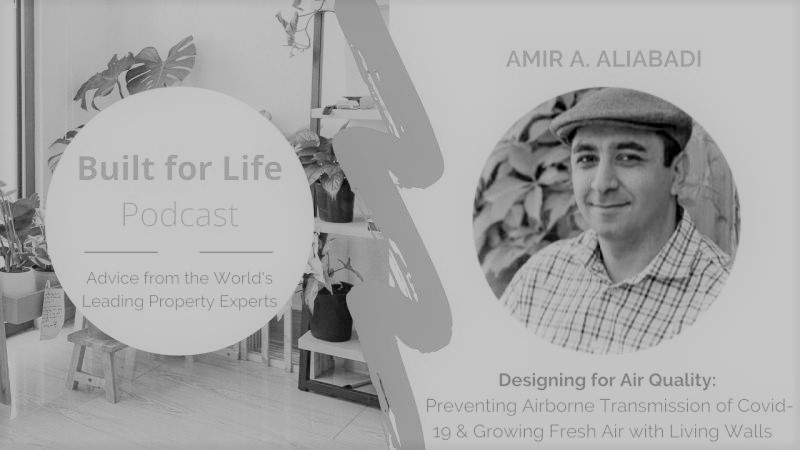
Amir A. Aliabadi's interview with LifeProven Wellbeing Property Consultancy on "Designing for Air Quality".
April 22, 2020 Denis Clement successfully defends his M.A.Sc. thesis titled: "A Regional Probabilistic Dust Emission Management Model for Construction Activities". Congratulations to Denis!
April 1, 2020 Amir A. Aliabadi publishes an educational video for healthcare workers describing physics of airborne transmission of infectious disease, specifically in healthcare facilities. Topics cover the airborne infection pathway, aerosols, and various control measures including environmental, ventilation, personal protective, and procedural controls.
Preventing Airborne Transmission of COVID-19: Guide for Hospital Workers - A Science-Based Approach.
March 10, 2020 Amir A. Aliabadi takes a class photo with students of ENGG*1210: Engineering Mechanics at the University of Guelph. This course is a foundation for engineering, developing concepts in three-dimensional thinking, vector calculus, laws of motion, statics, and dynamics analysis of rigid bodies.
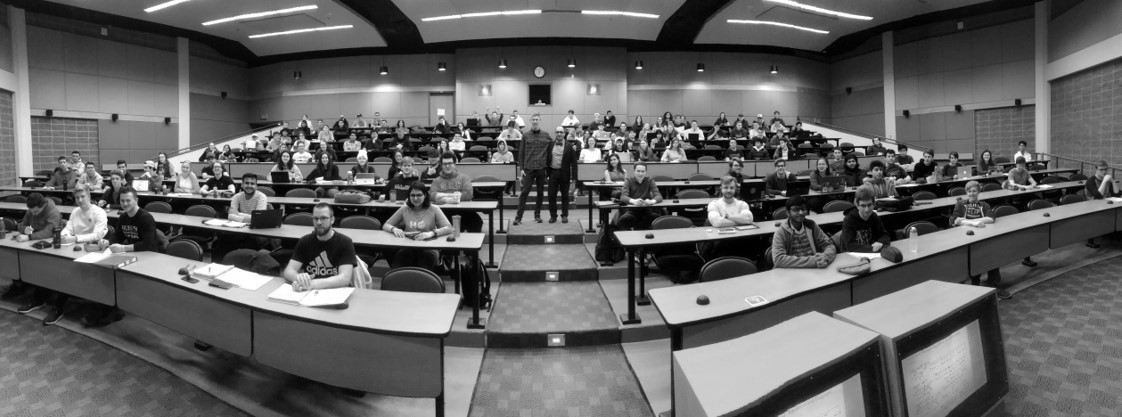
Class photo of Amir A. Aliabadi and students in the course ENGG*1210: Engineering Mechanics at the University of Guelph in Winter 2020.
January 12-16, 2020 Amir A. Aliabadi presents three talks in the 100th Annual Meeting of the American Meteorological Society (AMS), Boston Convention and Exhibition Center, Boston, U.S.A. The talks are titled "The Vertical City Weather Generator (VCWG 1.0)": Link to Recorded Presentation, "The Budgets of Turbulence Kinetic Energy and Heat in the Urban Roughness Sublayer": Link to Recorded Presentation, and "Simulation of Diurnal Green House Gas (GHG) Emission Flux from a Complex Mining Facility Using WRF": Link to Recorded Presentation. Link to AMS website
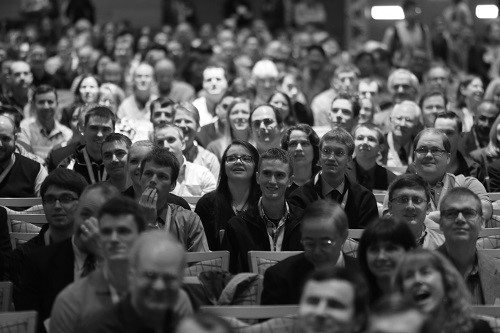
The 100th Annual Meeting of the American Meteorological Society, Boston Convention and Exhibition Center, Boston, U.S.A.
December 11, 2019 Ryan Byerlay successfully defends his M.A.Sc. thesis titled: "A Direct Georeferencing Imaging Technique to Identify Earth Surface Temperatures Using Oblique Angle Airborne Measurements". Congratulations to Ryan!
October 16, 2019 Hossam Elmaghraby successfully defends his Ph.D. thesis titled: "Ventilation Performance of Passenger Aircraft in Controlling Contaminant Dispersion from Expiratory Events". Congratulations to Hossam!
September, 2019 Professor Alejandro Adem has published a communication on the importance of mathematics toward development of a knowledge economy: Mitacs: Mathematical Roots for Innovation in Canada - Mathematics Foundation Underpins 20-Year Evolution of Success and Growth at Mitacs. Download Communication
September 1, 2019 Amir Nazem successfully defends his M.A.Sc. thesis titled: "Novel Sensing Technology and Mesoscale Modelling Approaches for Meteorological Investigations over a Mining Facility". Congratulations to Amir!
August 20, 2019 Md. Rafsan Nahian successfully defends his M.A.Sc. thesis titled: "Complex Meteorology over Complex Terrains: Assessment of Topography, Land Use, Grid Resolution, and PBL Scheme Modifications in the Weather Research and Forecasting (WRF) Model". Congratulations to Rafsan!
July 8-18, 2019 AIR Lab members Amir Nazem, Rafsan Nahian, Manoj K. Nambiar, Ryan Byerlay, and Amir A. Aliabadi present their research in a poster in the International Union of Geodesy and Geophysics (IUGG) 27th General Assembly at Palais des Congres, Montreal, Quebec, Canada. The poster is titled "Complex Meteorology over a Complex Mining Facility". Link to IUGG's Website
June 2-5, 2019 AIR Lab members Mohsen Moradi, Hossam Elmaghraby, Rafsan Nahian, Ryan Byerlay, and Amir A. Aliabadi present their research in the Canadian Society for Mechanical Engineering (CSME) 2019 International Congress at Western University, London, Ontario, Canada. The research talks are titled "A Vertical Diffusion Model to Predict Profiles of Temperature within the Lower Atmospheric Surface Layer: Simple or Complicated?", "Can We Limit the Passenger Exposure to Airborne Contaminants in Commercial Aircraft Cabins During the Climb Leg?", "WRF Simulations of Urban Climate: Do We Need Low or High Topographic Resolution?", "An Airborne Thermal Imaging Methodology for Mapping Land Surface Temperature (LST) with a High Spatiotemporal Resolution", and "A Very Large-Eddy Simulation (VLES) Model for Investigation of the Thermally-Stratified Atmospheric Boundary Layers: Reductionist and Practical", respectively. Link to CSME's Website
April 4, 2019 The undergraduate students in environmental engineering successfully develop a gondola design and integrate airborne sensors for the Tethered And Navigated Air Blimp (TANAB) version 3. This instrument can be used for airborne weather sensing, meteorological assessment, earth surface imaging, and air quality measurements. Congratulations to the team for taking on the design challenge.
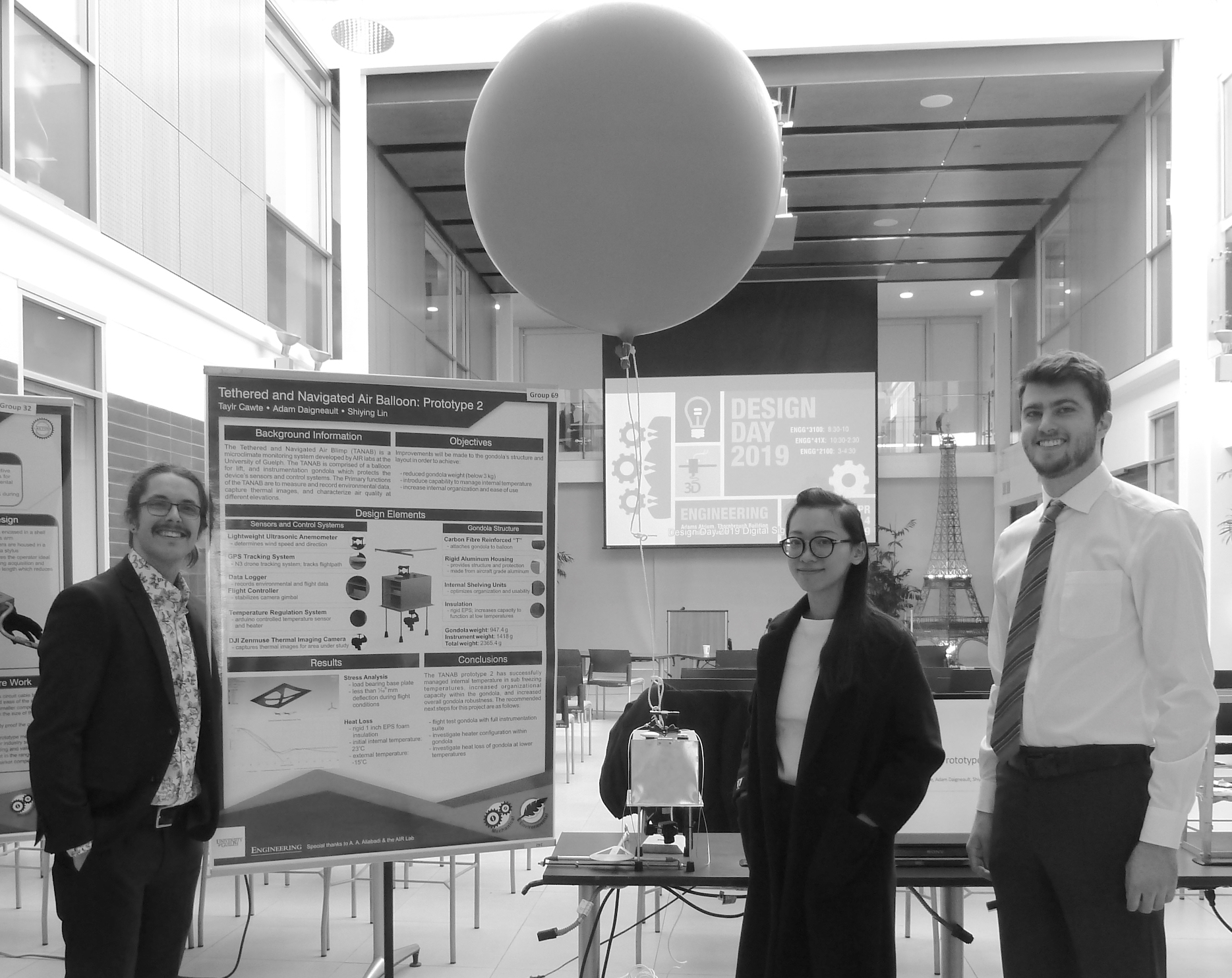
From left to right: Taylr Cawte, Heaven Lin, Adam Daigneault, Design Day 2019, School of Engineering, University of Guelph.
February 1, 2019 Members of the Atmospheric Innovations Research (AIR) Laboratory at the University of Guelph supervised by Amir A. Aliabadi as their primary supervisor:

From left to right: Ryan Byerlay, Mohsen Moradi, Amir Nazem, Mojtaba Ahmadi-Baloutaki, Md. Rafsan Nahian, Manoj Kizhakkeniyil, Seyedahmad Kia, and Amir A. Aliabadi
December 8, 2018 Do you take notes in classroom using a pen or a laptop? Is there a difference between learning performance using traditional versus modern technologies in the classroom? Read "The Pen Is Mightier Than the Keyboard: Advantages of Longhand Over Laptop Note Taking" by P. A. Mueller and D. M. Oppenheimer in 2014. Download Article
November 24, 2018 Are mathematics curriculum in Ontario schools good enough to prepare students for university programs involving Science, Technology, Engineering, and Mathematics (STEM)? Read "Exploring the Impact of Changes in Ontario's Senior Mathematics Curriculum on Student Success in STEM Programs" by G. Sahmbi in 2014. Download Thesis
November 7, 2018 Are Canadian elementary and secondary schools putting an acceptable effort teaching students mathematics and literacy? Are students learning as effectively? Are students being prepared for post secondary education appropriately? Read the recent reports by Education Quality and Accountability Office (EQAO) for statistical data during the past five years. Link to EQAO's Website, Download Report on Mathematics, Download Report on Literacy
August 6-10, 2018 Amir A. Aliabadi presents a talk in the 10th International Conference on Urban Climate/ 14th Symposium on the Urban Environment, American Meteorological Society (AMS), New York City College, New York City, U.S.A. The talk is titled "Complete Characterization of Turbulence in an Urban Canyon Under All Wind Directions, Wind Speeds, and Thermal Stability Conditions". Link to AMS website

American Meteorological Society Meeting, New York City College, New York City, U.S.A.
May 27-30, 2018 AIR Lab members Mohsen Moradi, Hossam Elmaghraby, and Soroush Ebadi, present their research in the Canadian Society for Mechanical Engineering (CSME) 2018 International Congress at York University, Toronto, Ontario, Canada. The research talks are titled "Scaling and Machine Learning Analysis of Turbulent Fluxes of Momentum and Heat in the Microclimate of an Urban Canyon", "Effect of Body Forces Due to Aircraft Acceleration on Ventilation Airflow and Contaminant Dispersion in Passenger Aircraft Cabins", and "Effect of Dispersing Copper Oxide Nanoparticles to RT-35 Filled a Circular Thermal Energy Storage System", Respectively. Link to CSME's Website
April 5, 2018 The undergraduate students in environmental engineering successfully develop a gondola design and integrate airborne sensors for the Tethered And Navigated Air Blimp (TANAB). This instrument can be used for airborne weather sensing, meteorological assessment, earth surface imaging, and air quality measurements. Congratulations to the team for taking on the design challenge.
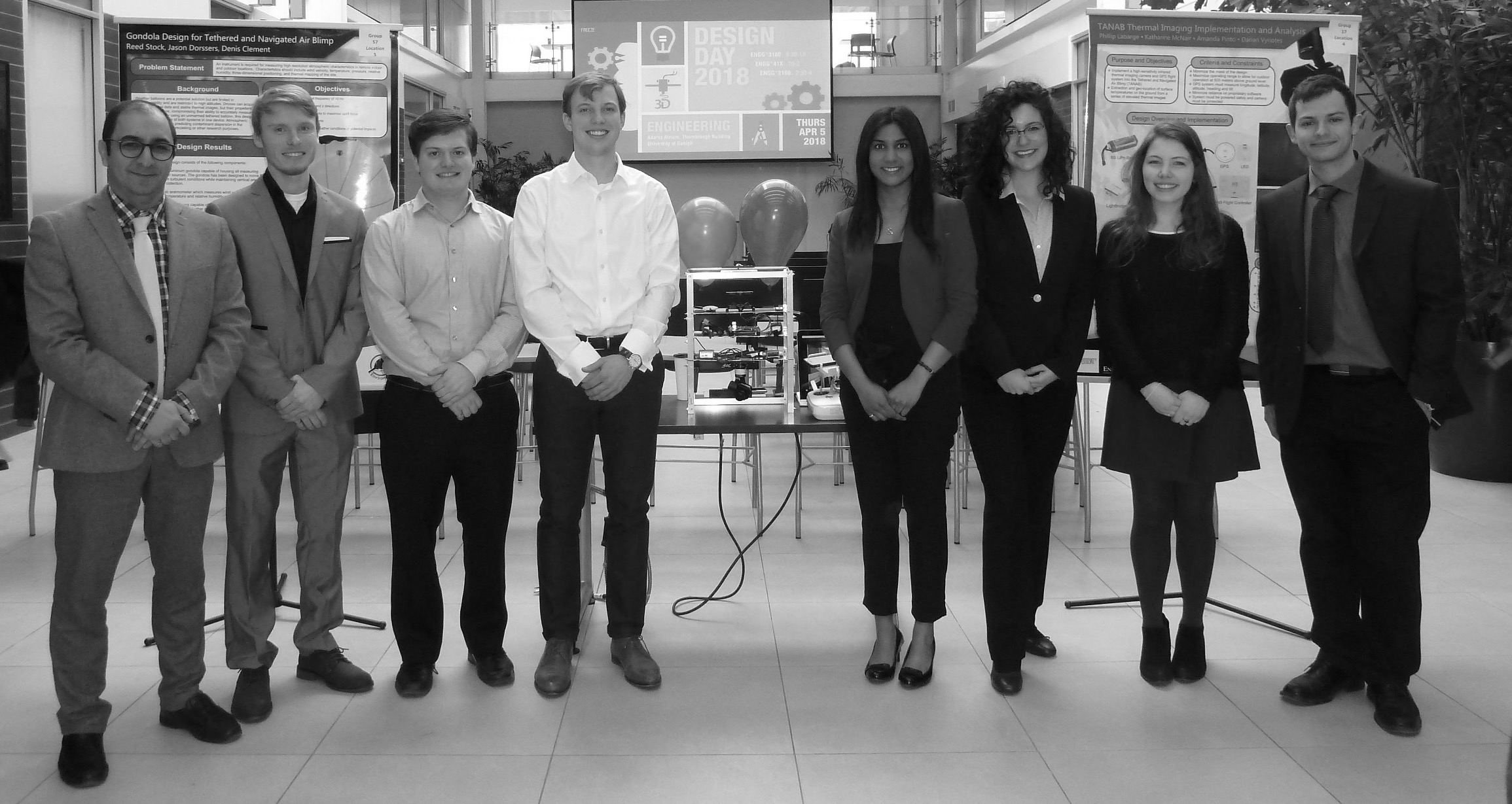
From left to right: Amir A. Aliabadi, James Stock, Denis Clement, Jason Dorssers, Amanda Pinto, Darian Vyriotes, Katharine McNair, Phillip Labarge, Design Day 2018, School of Engineering, University of Guelph.
January 19, 2018 The AIR Laboratory is seeking successful undergraduate students who will obtain NSERC Undergraduate Student Research Awards (USRA) for the Summer 2018 semester.
December 8, 2017 Amir A. Aliabadi is featured by the Office of Graduate and Post Doctoral Studies at the University of Guelph. Link to Office of Graduate and Post Doctoral Studies at the University of Guelph
October 27, 2017 Amir A. Aliabadi joins long-time collaborator Reza Aliabadi in the American Architecture Prize ceremony held in New Museum, New York, U.S.A. Reza Aliabadi is an architect and founder of atelier rzlbd. He is one of the recipients of 2017 American Architecture Prize for the design of a residential house in Toronto. Link to American Architecture Prize (AAP) Link to atelier rzlbd
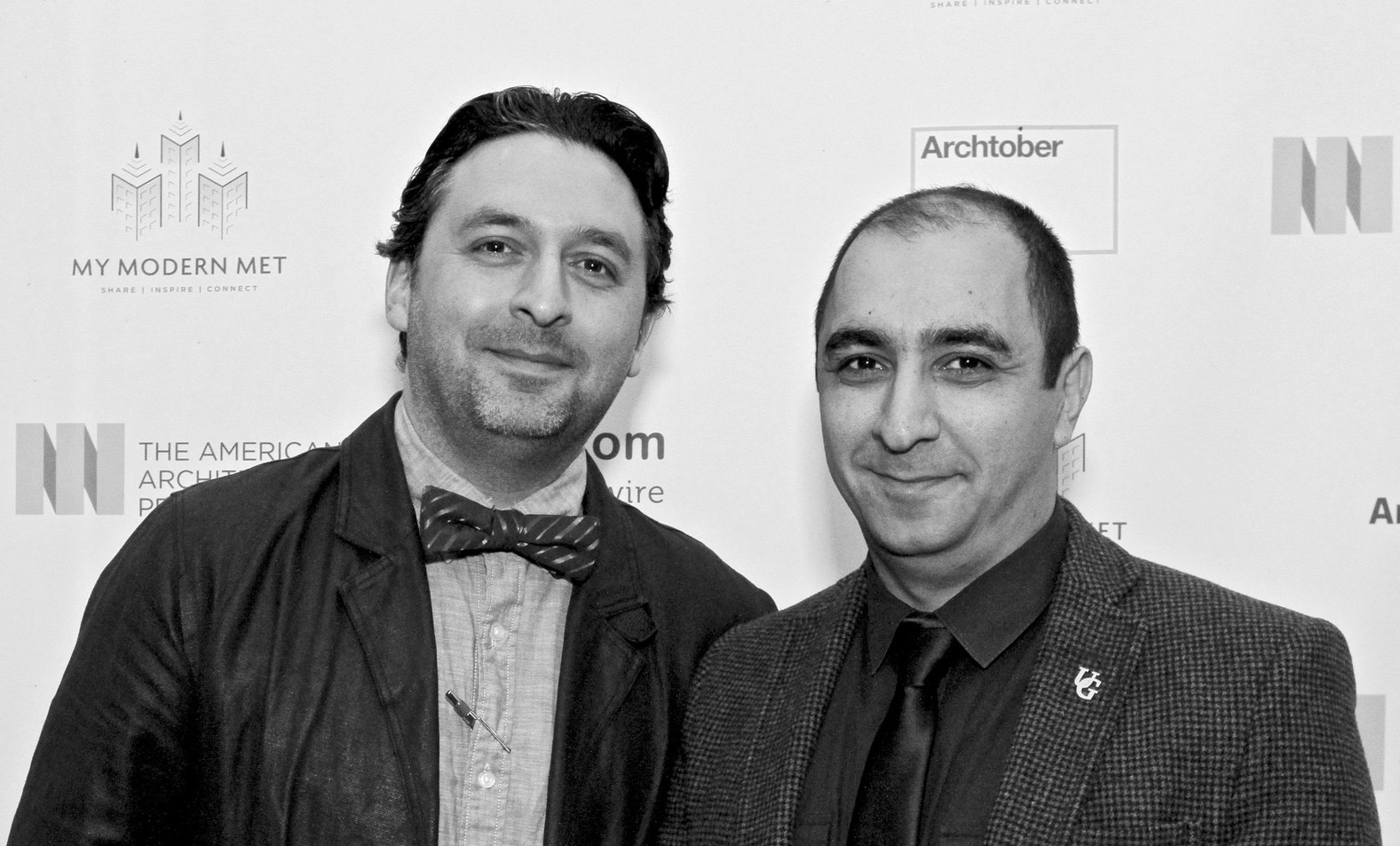
From left to right: Reza Aliabadi and Amir A. Aliabadi, American Architecture Prize, 2017, New Museum, New York, U.S.A.
July 17-21, 2017 Amir A. Aliabadi will present a talk in the next Connaught Summer Institute in Arctic Science. The talk will be focused on atmospheric chemistry, physics, and air quality monitoring in the Arctic. The Connaught Summer Institute in Arctic Science: Atmosphere, Cryosphere, and Climate brings together students and scholars who are engaged in Arctic research, to provide an understanding of the Arctic climate and the processes that control it, and to establish an interdisciplinary forum in which they can discuss current issues and research opportunities. Download Poster June 1, 2017 Amir A. Aliabadi visits RWDI to meet with Dr. Anton Davis (Wind Engineering and Sustainable Design Consultant at RWDI), Dr. Duncan Phillips (Principal and Consultant in the Science of Buildings, Structures & Environment at RWDI), and Prof. Afshin Afshari (Energy Lead at Masdar Institute of Science and Technology, U.A.E) to discuss atmospheric boundary layer research in the urban, industrial, and remote environments.

From left to right: Dr. Anton Davis, Amir A. Aliabadi, Prof. Afshin Afshari, and Dr. Duncan Phillips: RWDI in Guelph
May 1-4, 2017 Amir A. Aliabadi visits a mining facility to survey the site for an anticipated multi-year and multi-million dollar area emissions quantification project led by Nick Veriotes P.Eng. BCEE, C.Chem. Mr. Veriotes is a multi-certified Senior Environmental Engineer with more than 23 years of experience leading and implementing environmental management systems with growing emphasis in the last 10 years on Green House Gas (GHG) strategy development, management, forecasting, and mitigation. Mr. Veriotes is a graduate of the Environmental Engineering program at the University of Guelph.
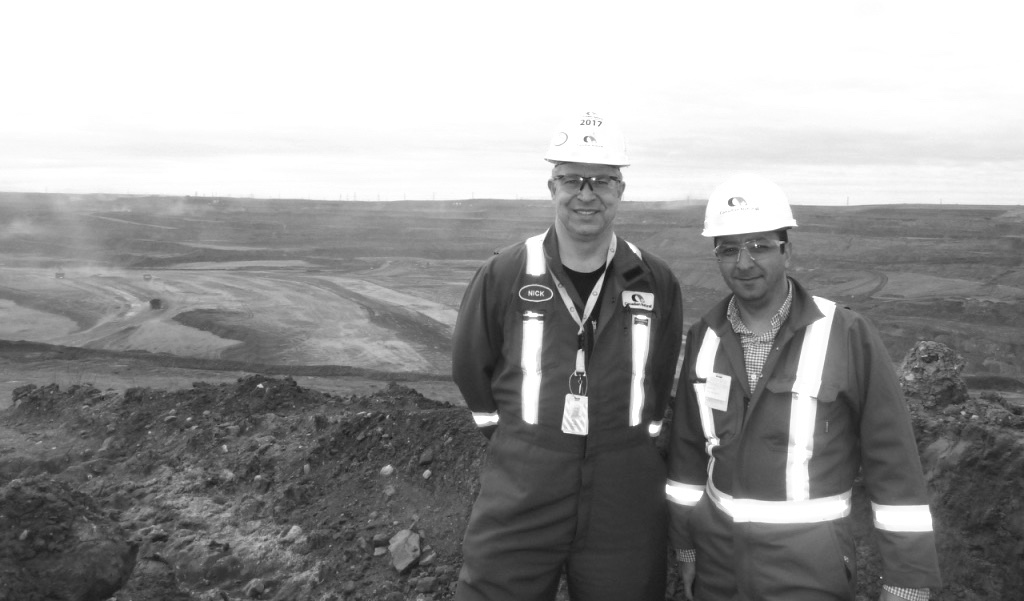
Nick Veriotes (left) and Amir A. Aliabadi (right): an Alberta oil sands facility
April, 2017 Canadian accomplishments in science and scholarly inquiry have long been a source of national pride. However, by various measures, Canada's research competitiveness has eroded in recent years when compared with international peers. The change coincided with a period of flat-lining of federal spending through the four core funding agencies that support researchers in universities, colleges, institutes, and research hospitals. In those years funds were also directed preferentially to priority-driven and partnership oriented research, reducing available support for independent, investigator-led research by frontline scientists and scholars. Read the report by "Canada's Fundamental Science Review Panel" to address relevant issues in this area. The report is titled "Investing in Canada's Future: Strengthening the Foundations of Canada's Research". Download Report April 5-9, 2017 Amir A. Aliabadi will present a talk in the next American Association of Geographers (AAG) Annual General Meeting, The Hynes Convention Center, Marriott, Copley Place, and the Sheraton, Boston, U.S.A. The talk is titled "Effects of Roof Edge Roughness on Air Temperature and Pollutant Concentration in Urban Canyons". Link to AAG website January 2017 Science Exposed is a contest organized by the Natural Sciences and Engineering Research Council of Canada (NSERC) and devoted exclusively to images of scientific research, in all fields of study. In 2016, NSERC was proud to collaborate with the Association francophone pour le savoir (Acfas) and open La preuve par l'image to candidates all across Canada. Acfas is responsible for the Francophone segment of the contest, La prevue par l'image, and NSERC is responsible for the Anglophone segment, Science Exposed. Students are encouraged to participate in this contest. Link to Contest Details January 2017 Professor John P.A. Ioannidis at Stanford University has published a critical essay about why many research findings that are published cannot be trusted to report the truth. The essay is titled "Why Most Published Research Findings Are False ". Link to Article January 2017 We are living in an age of innovation, an unprecedented era of technological progress and prosperity driven by energy. However, most of this energy comes from fossil fuels such as coal, oil and natural gas that account for a majority of global carbon dioxide (CO2) emissions. We know that CO2 emissions are a leading contributor to climate change, and the world will need a portfolio of solutions to address this Grand Challenge. The $20M NRG COSIA Carbon XPRIZE will challenge the world to reimagine what we can do with CO2 emissions by incentivizing and accelerating the development of technologies that convert CO2 into valuable products. These technologies have the potential to transform how the world approaches CO2 mitigation, and reduce the cost of managing CO2. Link to CARBON XPRIZE website November 14-15, 2016 Amir A. Aliabadi will present a talk in the next NETCARE Workshop at the University of Toronto, Toronto, Canada. The talk is titled "Ship emissions measurement in the Arctic by plume intercepts of the Canadian Coast Guard icebreaker Amundsen from the Polar 6 aircraft platform". NETCARE is a Network on Climate and Aerosols: Addressing Key Uncertainties in Remote Canadian Environments. Link to NETCARE website November 14-15, 2016 Amir A. Aliabadi will present a poster in the next NETCARE Workshop at the University of Toronto, Toronto, Canada. The poster is titled "Vertical Turbulent Mixing of Momentum and Heat in the Summer Time Stable Arctic Lower Troposphere". NETCARE is a Network on Climate and Aerosols: Addressing Key Uncertainties in Remote Canadian Environments. Link to NETCARE website August 2015 Professor Ali Modarres, Department of Urban Studies, University of Washington, has published a critical essay about the nature of academic publishing in the present time. The essay is titled "It's not Just the Author: The Reader and the Editor Are Dead, Too". Link to Article July, 2015 During the last decade, engineering programs have been growing most rapidly in Canadian universities. In this light, it is worth understanding the engineering job market as well. The Ontario Society for Professional Engineers (OSPE) has just published a report to address this. The report "Crisis in Ontario's Engineering Labour Market: Underemployment Among Ontario's Engineering-Degree Holders" focuses on individuals with engineering degrees who are working in jobs that don't necessarily require a university degree. Download Report February 2015 Amir A. Aliabadi's research on airborne infection was recognized in an article titled "Take a Deep Breath", published in Popular Science. Link to Article
July, 2014 Amir A. Aliabadi participates in an environmental field campaign near Resolute Bay, Nunavut, Canada, in support of the NETCARE (Network on Climate and Aerosols: Addressing Key Uncertainties in Remote Canadian Environments) project. NETCARE is a network comprised of researchers from ten Canadian universities (Toronto, UBC, UQAM, Waterloo, UQAR, Laval, Dalhousie, Calgary, Sherbrooke, Victoria) and five partner institutions (Environment Canada, Fisheries and Oceans Canada, Alfred Wegener Institute, Max Planck Institute, Johannes Gutenberg University). NETCARE is one of seven networks funded by the new Climate Change and Atmospheric Research (CCAR) program at NSERC.
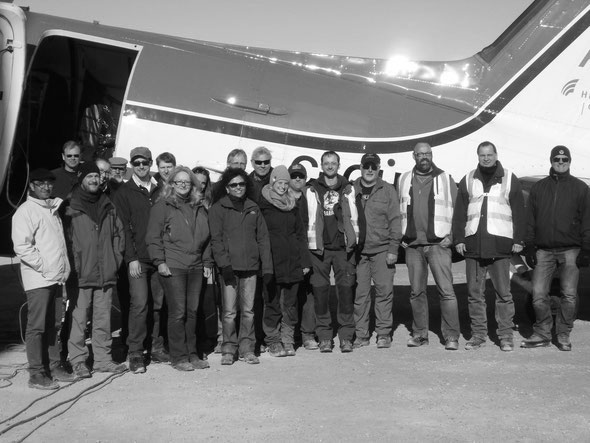
Amir A. Aliabadi, colleagues, and collaborators near the Polar 6 Research Aircraft used to collect atmospheric data.